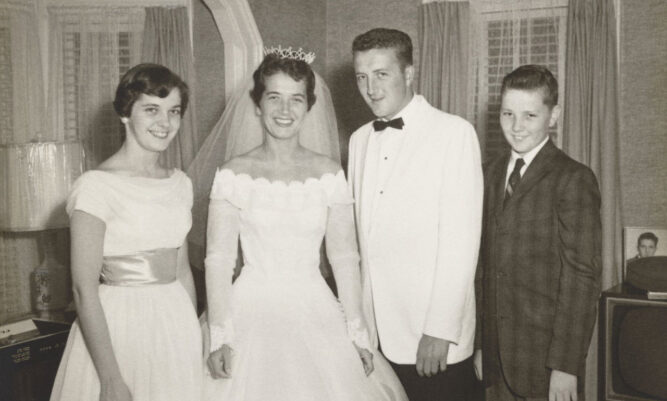
Love is something that we all need but it sometimes takes on forms that we may not fully appreciate. We might even think that our need for this type of attraction diminishes as we get older.
In the following story, we read about a woman in a nursing home who found love. It wasn’t something that the entire family was on board with, however, and problems arose.

We can all learn lessons from the things that we see and hear around us and that is true of the story. It’s a tribute to enduring love and the fact that all of us need to look at life differently.
The scent of lavender and sunshine hung heavy in the air as I nervously fiddled with the silver locket around my neck. Peter, his eyes crinkling at the corners with a smile, held my hand, the warmth a stark contrast to the chill of the nursing home hallway.
“Evelyn, are you ready?” he asked, his voice a comforting rumble….
At 75, I never thought I’d find love again, let alone stand here, my heart pounding like a hummingbird’s wings, about to accept Peter’s proposal.

My life had been a tapestry woven with loneliness, a failed marriage that dissolved into resentment, and a daughter, Sarah, who, consumed by her own life, drifted further and further away.
Peter, a retired history professor with a twinkle in his eye and stories that stretched back decades, had become my beacon in the monotonous routine of the nursing home.
He’d been my chess partner, my confidant, and the hand I reached for during those endless bingo nights. His proposal, a simple diamond ring nestled in a velvet box, was the most precious gift anyone had ever given me.
“Yes, Peter,” I whispered, a tear slipping down my cheek. His gentle thumb brushed it away, his touch sending shivers down my spine. We were old, yes, but love didn’t have an expiry date, and in Peter’s eyes, I saw not wrinkles but a reflection of the woman I used to be.
The following days were a whirlwind of shared laughter and secret planning. We discussed a small, intimate ceremony in the nursing home’s garden. Peter painstakingly researched poems of love and commitment, his voice raspy with emotion as he practiced them under his breath.
The staff, initially surprised, got swept up in our joy. Mrs. Peabody, the usually grumpy resident down the hall, even volunteered to help with decorations. There was a palpable shift in the air, a renewed sense of purpose that transcended bingo nights and lukewarm meals.
The phone call to Sarah, however, became a storm cloud on my horizon. Her voice, sharp and laced with disapproval, echoed in my ear, replaying every cruel word. “Pathetic,” she’d called it. “Dress-up.” Shame burned in my throat, choking back the retort that threatened to spill out. I ended the call, feeling a hollow ache where excitement had once resided.
Peter, sensing my distress, held me close. “Evelyn,” he murmured, “your daughter doesn’t understand. It’s okay. This is about us.” His words were a balm, but a sliver of doubt remained. Was I truly being childish? Was this, as Sarah had said, a silly charade?
The day of the ceremony dawned bright and crisp. The nursing home staff had transformed the garden into a haven, with flower arrangements in mismatched vases and white chairs arranged in a small circle. Peter, dapper in a borrowed suit, looked like a dream come true. His gaze softened as I walked down the makeshift aisle, my flower girl, a mischievous young resident named Lily, scattering petals at my feet.
The ceremony was short but heartfelt. As Peter slipped the ring onto my finger, a wave of emotions washed over me – relief, joy, and a deep, bittersweet pang at Sarah’s absence. With trembling hands, I reached for Peter’s hand, vowing to cherish him in sickness and in health, ’til death do us part.
The afternoon flew by in a blur of laughter, cake, and impromptu dancing. Even Mrs. Peabody, a notoriously picky eater, devoured an extra slice of cake. As the sun began its descent, casting long shadows across the garden, I looked around at the smiling faces. In that moment, I felt a completeness I hadn’t known in years. This wasn’t pathetic. This was love, pure and unadulterated, a testament to the fact that life could bloom anew, even in the twilight years.
Later that evening, Peter helped me back to my room. Just as I was about to settle in, a knock startled me. Sarah stood at the door, her face a mask of conflicting emotions. “Mom?” she said hesitantly.
My heart clenched. “Sarah,” I croaked.
She stepped inside, her eyes flitting between the happy faces on display photos on my bedside table and the simple wedding band on my finger. “I…” she began, her voice tight. “I saw the pictures online.”
A social media-savvy nurse had uploaded photos of the ceremony. “It looked… nice,” Sarah finished lamely.
“Nice?” I echoed, hurt flashing in my chest. “You called it pathetic.”
Silence stretched between us, thick and heavy. Finally, Sarah sighed. “Mom,” she started, tears welling in her eyes, “I was wrong. So wrong. Seeing those pictures, seeing you so happy – it made me realize what a fool I’ve been…”
Tears streamed down Sarah’s face, her carefully constructed facade crumbling. My anger subsided, replaced by a wave of sadness. “Sarah, come here,” I said, patting the spot on the bed beside me.
She hesitated, then crawled in, burying her face in my shoulder. My thin nightgown was damp with her tears. “Mom,” she whispered, “I’m so ashamed of how I treated you. All this time, you were just trying to find some happiness, and I was…”
“Scared,” I finished for her, squeezing her hand. “Scared of letting me be happy. Scared that maybe it would mean you were fine without me.”
The truth, harsh but undeniable, hung in the air. She’d been so consumed with her own life, the pressures of work and raising a family, that she’d built a wall between us. But seeing me, a woman pushing 80, finding a love that defied expectations, had shattered that wall, revealing the emptiness within.
“I’m happy for you, Mom,” Sarah continued, her voice muffled. “Truly. But… what about Dad? How would he feel?”
The question hung heavy. My ex-husband, a man Sarah held on a pedestal despite his shortcomings, had been a ghost in our conversations for years. “He wouldn’t care, Sarah,” I said finally, the words tinged with a bitterness I hadn’t realized lingered. “He always checked out years ago.”
There was a long silence. “I… I need to go,” Sarah said, pulling away. “But, Mom, can I come visit more? Can I be a part of this…?”
A hesitant smile tugged at my lips. “We’d love that, honey. We both would.”
The next few weeks were a whirlwind of change. Sarah visited more often, bringing her children, two rambunctious toddlers who filled the sterile nursing home hallways with shrieks of laughter. Peter, a natural with children, played pirates and tea party with them, his eyes twinkling with an energy I hadn’t seen before. Sarah, initially awkward, gradually relaxed, laughing along with them.
One afternoon, while the children were napping, Sarah and I sat in the garden. “Mom,” she started, “I know I messed up. But seeing you happy – seeing Peter happy – it makes me want to fix things with Dad. Maybe… maybe we could try couples’ therapy?”
I looked at her, surprised. Therapy had never been an option during their marriage. It had always been about “toughing it out” for the sake of appearances. “Are you sure, honey?”
“I’m tired of being tired,” she said, a new resolve in her voice. “Maybe it’s time we tried to understand each other, even if it doesn’t work out.”
A flicker of hope ignited in my chest. Maybe, just maybe, it wasn’t too late for my daughter to find her own happily ever after. As I watched her play with the children later that day, a quiet sense of peace settled over me.
Love, it seemed, wasn’t a finite resource. It could bloom in unexpected places, weaving a tapestry of connection across generations, mending broken threads and offering a chance at redemption, even in the twilight of our lives.


